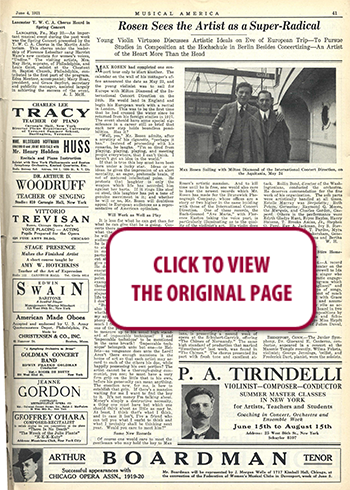 100 YEARS AGO IN MUSICAL AMERICA (397)
100 YEARS AGO IN MUSICAL AMERICA (397)
June 4, 1921
Page 41
Rosen Sees the Artist as a Super-Radical
Young Violin Virtuoso Discusses Artistic Ideals on Eve of European Trip—To Pursue Studies in Composition at the Hochschule in Berlin Besides Concertizing—An Artist of the Heart More Than the Head
MAX ROSEN had completed one concert tour only to start another. The calendar on the wall of his manager’s office announced the date as May 23, and the young violinist was to sail for Europe with Milton Diamond of the International Concert Direction on the 24th. He would land in England and begin his European work with a recital in London. This was to be the first time that he had crossed the water since he returned from his foreign studies in 1917. The event should have some special significance in a career still so brief that each new step holds boundless possibilities. Has it?
“Well, yes,” Mr. Rosen admits, after a scrutiny of his cigarette, “perhaps it has.” Instead of proceeding with his remarks, he laughs. “I’m so tired from playing, playing, playing, and meeting people everywhere, that I can’t think. I haven’t got an idea in the world.”
If that is true this boy must have been born under a lucky star. Ideas or no ideas, he gives the impression of an alert mentality, an eager, prehensile brain, if not of matured intellectual poise. He protests that laughter is only the weapon which life has accorded, him against her hurts. If it rings like steel on steel, this laughter has yet a tone of genuine merriment in it; and whether he will or no, Mr. Rosen will doubtless appeal to European audiences as a representative of American optimism.
Will Work as Well as Play
It is less for what he can get than for what he can give that he is going. Concerts there must be, because concerts are what the concert artist lives on. And he will be glad—who wouldn’t? —if new audiences take to him as kindly as those he is leaving. But above all he wants to study; wants to complete the work in composition which an untimely departure from the Hochschule in Berlin cut short; wants to fit himself thus to give rather more than he has yet given. He does not believe that creative and executive musicianship must be mutually exclusive when developed to the highest point. He cites Liszt and Kreisler as examples. And in the next breath, though perhaps without intending any connection, “I’m an awfully uneven player. One of the funniest things in life to me is the critic who assumes that I don’t know that.
“But if I know when I play badly, I also know when I play well. I doubt whether I ever played better than at my appearance with the National Symphony at the end of April. Fancy how much I felt like laughing when I read in one of the papers that ‘Mr. Rosen failed to measure up to his usual high standard of impeccable technique!’ I and ‘impeccable technique’ to be mentioned in the same breath! ‘Impeccable technique’ belongeth unto but one—to Heifetz—as vengeance does unto the Lord! Aren’t there enough mansions in the house of art so that each artist may accord to each of the others his due, while happily possessing his own portion? The artist cannot be a thorough-going communist, you see; he must have a very firm grip on the little that is his own, before his generosity can mean anything. The question now, for me, is how to establish that grip. If there’s a mansion waiting for me I want to find the key to it. It’s not money I’m talking about. Money’s simply a destructive necessity, a thing one must have but which one should think about as little as may be. At least, I think that’s what I think, and in case it isn’t, I’ve a friend who can tell you what I ought to think and what I probably shall be thinking next year. Would you care to meet him?”
Some New Records
Of course one would care to meet the gentleman who may hold the key to Rosen’s artistic mansion. And to kill time until he is free, one would also care to hear the newest records which Mr. Rosen has made for the Brunswick Phonograph Company, whose offices are a story or two higher in the same building with those of the International Concert Direction. One of these records, the Bach-Gounod “Ave Maria,” with Florence Easton taking the voice part, is particularly illuminating as to the quality of the violinist’s art. His violin does not speak; it cries, and that with an almost more than human poignancy. Not intellect, not will is the spring of this player’s inspiration, but emotional feeling. Obviously true are the words of his friend, a brother of Milton Diamond, his manager: “Max Rosen is a radical. He is an artist, and therefore a more radical radical than the adherents of any program of social revolution can be. He cannot play politics; he cannot defer the chance of present defeat for that of future victory; he must live, as nearly as may be, each moment for itself. And thus he risks running counter to small conventions, but the same roseate hope beckons him as every other artist, that of a world set free by men’s living from the impulse of the pure heart and no longer from the malice of the calculating head.” —D. J. T.




 RENT A PHOTO
RENT A PHOTO





